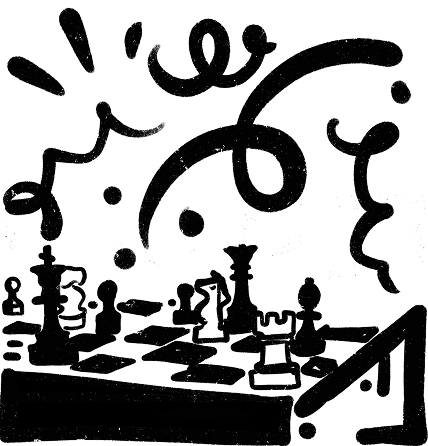Category: Cognitive technologies
The secrets of the chessboard: how reality is structured
“One thing I’ve learned in the last seven years: in every game and con there’s always an opponent, and there’s always a victim. The trick is to know when you’re the latter, so you can become the former”
Revolver, movie
You didn’t choose this game; you didn’t even notice how you got involved in it.
Everything happened quite simply: someone handed you a lacquered board with pieces and announced, “You’re the main player,” with a small caveat — this is the only game where “replaying” is only possible in the next round.
At first glance, there’s nothing complicated: 64 squares, 16 pieces on each side, white — for you, black — also for you, they just aren’t yet aware of it. You are the rightful owner of the board, so you can move the pieces in any direction and create winning combinations. You can learn the rules of the game as you go; the main thing is to smile during briefings and make moves in the CRM.
But if this is a game, then where is the opponent?
You carefully set up the pieces on the board: here they are — brave, well-groomed, confident, ready to give their lives for their king at any moment. Deep down in your strategic consciousness, you understand how the game will end, but still, you start to play.
Move ⟶ e4
— Hello, let’s get acquainted. Who are you?
— I am your deputy. My mission is to make your life easier. I fire people, give orders, track efficiency. I am the only one who can travel through this black-and-white maze and the only one who knows how it’s arranged. I am you with fewer powers, so I do all the dirty work for you.

— And we are the legal and HR departments. We keep order and ensure all regulations are followed precisely. We can step into a couple of offices if needed, but we don’t like wandering through corridors. If we happen to meet on adjacent squares…
— Greetings from IT! Without our developments, you’re all just wooden figures. If you start arguing or claim there’s no money—we’ll turn off the internet and go to our competitors.
— The creative team is on the line! And we’ve already come up with everything.
— Creatives… I’m wary of all these lovers of unconventional thinking. And what are those figures standing along that straight line over there?
— Nevermind; those are expendable material—just pawns. They don’t even have voices; we distinguish them by the sound of chairs they get up from. Their job is to move where they’re told—for the good of the company, of course. We all exist here solely for the common good and, naturally, for you. Command us.
Move ⟶ Nc3
The first move is always a lie. In any game, the opening move is meant to probe the ground, gauge the overall tone of the game, and showcase your best qualities.
You enter a room where no one knows you, and you smile. Isn’t this the perfect moment to be anyone you want? But no, you choose to be “effective.”
You say: “I want to develop myself,” implying: “I’m a good boy! I’m ready to bend for money.”

You fill out a form, writing about your stress resistance, even though you yelled at the kettle this morning. You claim to be a team player, forgetting to mention that you despise people who breathe loudly. You are a beautifully crafted illusion—a file with an HR photo, a molecule of corporate DNA that will be fired at the first reorganization.
You are just a file in the “Candidates” folder, and I am the person who created that folder.
You’re not lying—you will adapt because that’s what’s expected. The office doesn’t tolerate weakness but loves presentations titled “New Strategy.”
I built this office so everyone could pretend: pretend that everything makes sense, that efficiency is more important than solitude, that team synergy cures anxiety. Yeah, right!
Do you think I expect sincerity from you? No. I expect you to learn the rules. I know you always start with bluffing and then learn how to monetize it. That’s how leaders are made. That’s how founders grow. We both lie because we don’t have time for the truth.
Congratulations—now you’re in the game. And we’ll start from here.
Move ⟶ d4
— Can anyone explain to me what’s going on here?
— What exactly are you dissatisfied with?
— Where are half of the employees?
— They submitted resignation letters and left.
— How come? We need to submit the annual report tomorrow.
— The one I never liked?

— Excuse me?
— Well, you’re the director, I’m your deputy; I can make any decisions, implement any innovations, go wherever I want, talk to whoever I want. I didn’t like that project, so I’m shutting it down and removing the staff.
— That’s not allowed!
— You call it cruelty; I call it efficiency. And anyway, who can forbid me anything?
Move ⟶ Bc4
If you think you’re in control of the game—you’ve already lost.
Behold! There are predators in pinstripe suits in front of you: disguised pawns who have reached the other side of the board and now have the right to dictate their initiatives. They pretend to be part of the system only to blow it up from within.
They are not chosen. They are not called for. They simply stand up and take what’s theirs—everything except the throne. Their movements are too free: they can go any number of squares in any direction, and they skillfully take advantage of that. They always play alone. They have no team, only a board and an illusion of power. Every move they make is a display of vanity: “Look what I can do!” They even smile in a special way, as if they know all your weaknesses. They will never play your game, but they will skillfully draw you into theirs. They are you without morals or conscience.
There’s no real need in their presence, but they are invisibly present in every “Let’s have a call,” every “If you’re struggling, we have others,” and in every dream where you stand in a vast hall with wet pants. When they enter the game, you realize that this is for real.
They prefer to call themselves Queens, occasionally Kings.

Q – Quick
U – Unyielding
E – Enigmatic
E – Energetic
N – Narcissistic
Move ⟶ Qh5
— I urgently need this report.
— According to the internal work schedule, our workday ends precisely at 6:00 PM.
— Change the rules.
— We can’t.
—Then I’ll change them myself right now.
— We don’t recommend you do that.
— Why?
— That needs to be approved by HR.
— I’ll definitely take care of it.
— Delegate it to the Queen.
— Not a chance!
— Too bad. You’ll break the regulations.
— From now on, I intend to break all your regulations!
— Clause 5.4.1 of the internal policy, approved at the general meeting on June 14, 2017, clearly states that you can only violate regulations with the approval of the board of directors.

Move ⟶ Nf3
Burn in hell! Sometimes checkmate isn’t defeat but liberation.
These figures have always been nearby; you just didn’t notice them. You thought they were just boring, tired “bureaucrats” who somehow endure black-and-white rules through a dull, melancholic pleasure.

They know everything—even what you’ve forgotten or tried to forget: all reports, all backroom deals and proposals that never made it into the minutes. They were part of this company long before it even existed. They’ve survived all personnel reshuffles, crises, and leadership changes, learning lessons you still don’t understand. The downtrodden elders of office magic.
They know how to enter a room so that everyone falls silent—because they personally saw the previous director crying in a meeting room. They make no sudden moves; they never attack head-on; they even walk around diagonally against all logic. They know how you will fail and quietly wait for it.
Guardians of the corporate graveyard. Bishops.
B – Balanced
I – Indirect
S – Strategic
H – Hidden
O – Observant
P – Patient
Move ⟶ O-O
— I’ve lost access to the client database!
— You haven’t lost it. It’s an access restriction based on role.
— I’m the director! I need full access!
— According to the LDAP hierarchy, your account has read-only rights. Full access is only granted to users with the sys_admin role.
— Then give me the sys_admin role!
— Impossible. Internal audit classifies role transfer as a potential P1 vulnerability.
— Are you joking?
— Jokes are not part of the SLA.
— I have a meeting with investors in ten minutes!
— Great. You have ten minutes to submit a ticket via Service Desk, pass two-factor authentication, get approval from DPO, and sign an NDA regarding data leaks.
— It’s easier for me to hack everything!
— Try it. We love emergency situations: they give us a reason to document everything and rebuild the architecture.
— Do you even have a heart?
— We’re the IT department. We have a server.
— You leave me no choice…
— Fill out form 7-B and send it here: camelCase@ headOfItInfrastructure. Write everything in lowercase without spaces.
Format violations are ignored by the system. Resubmission is not provided.
— Are you kidding me?
— No, we make backups you’ll never see. That’s how the system works.

Move ⟶ Re1
Chess teaches: even if there’s chaos on the board—there’s always at least one way to victory. The key is not to surrender on the 20th move.
Oh yes. The IT department knows how to hurt—silently, without emotion, referencing regulations and logs at all levels of access. They’re always behind you, silent and perfectly calibrated, like your work schedule. No one will ever ask for their opinion because their opinion is the account deactivation protocol.
They move exclusively head-on, marching like iron soldiers across all vertical and horizontal squares—everywhere you hid your finances, lovers, and backup plans. This isn’t just a figure; it’s a system devoid of mercy and fear, an executioner of corporate revenge. And this system doesn’t fix—it restarts the world without you.
It only speaks in denial messages. Its greeting is “Error 403,” its farewell is a blue-green screen and a burnt folder with your dreams. It knows who you are, who you pretended to be, and how many times you clicked “Save as Draft.” It doesn’t remember offenses—it simply initiates deactivation. Guardian of internal borders. A bulldozer hiding in the support team.
It moves straight, steady, and to the end. The rook.

R – Rigid
O – Organized
O – Obedient
K – Knightly
Move ⟶ g4
— Where is the final media plan?
— I turned it into a mini-installation, and now the new plan speaks for itself. I also added a QR code that leads to a podcast about the futility of planning.
— Excellent! Do you have any idea what investors will say about this?
— Nothing at all! I’ve torn off the veil, and now we’re not chasing time—we’re destroying it. And this, by the way, is a new format: temporal art within the space of corporate absurdity.
— I think I’ve stopped understanding your logic.
— Logic? We need to have a soul! Your monotonous websites smell like last year’s cucumbers, which I recently sniffed on your deputy’s stiff mustache. So I replaced all content plans with a “brand affectation map.” No dates there—only feelings—just like in real life.
— Who even invited you here?
— Nobody. I’m the muse. Or a glitch. Depends on luck.
— Personally, you terrify me. Are you deliberately breaking all our processes?
— The great epoch begins with a crisis. Haven’t you read the manifesto?
— What manifesto?
— The one I wrote with a marker in the reception: “Long live chaos!”
— What are you even doing here?
— I’m here to “unfreeze thinking.” We have a concept pitch tomorrow, a deadline in six hours, and I have an idea nobody will like—so it’s perfect.
— But we do have… had an approved brand book, communication guidelines, strategy…
— Pfffffff. Words. I have a thought, and I’m implanting it directly into the sales department’s brain. Any questions?

Move ⟶ Qf3
Weak players fear losing pieces; strong ones fear losing time. That’s true!
The head of the creative department doesn’t build strategies: he sets them on fire and calls this “non-standard solutions.” He appears suddenly, like a bug in the bug in the code, and disappears before you even realize what happened. He doesn’t come to work—he invades the system like a virus with a taste for entropy, and everything he does contradicts your notions of normalcy.
He doesn’t follow logic; he jumps over it. Watching him, you understand that “a knight’s move” isn’t just an invented trajectory—it’s a fundamental life philosophy. He declares his depression openly, then seconds later, chewing gum, he stands at a top management meeting proposing to replace slogans with the sound of a slap on the forehead.

Nobody calls him: he appears out of nowhere, laughs, breaks old meanings, and vanishes into smoke of sarcasm while infecting everyone with contempt for the concept of “business goal.”
His purpose is to turn all your failures into concepts. He will never seek approval; he will take risks because he is the only one who understands chaos. His language is provocation; his goal—to drive everyone crazy and catch them in moments of raw, unfiltered truth.
He’s not just a figure. He’s an error in simulation that suddenly became genius. Not an employee—but a powerful weapon against a rotten system and your greatest advantage over competitors. His actions are incomprehensible; only later do you realize how lucky you were. He doesn’t accept rules; he creates new ones so that tomorrow you wake up in another dimension and realize everything that had been before he came remains in the past.
He won’t walk along squares—he’ll appear behind your back, break the board, and sign someone else’s name. The knight.
K – Knockout
N – Nonlinear
I – Inventive
G – Gripping
H – Heroic
T – Tactical
Move ⟶ Nh4
— Where are the quarterly reports?
— It’s not their turn yet.
— I asked for them to be submitted yesterday.
— Pawns don’t follow orders.
— But we won’t meet the deadline!

— Pawns aren’t here to deal with everything. They’re there so that you can say at the most critical moment: “I tried, but the team let me down.”
— Well, at least they could pretend they’re busy with something!
— Pretending is their job. That’s their main KPI.
— We’re a team! We should work as a single organism!
— With whom? Pawns? They’re not organs; they’re more like disposable bandages. You stick them on, they serve their purpose, and you toss them in the bin.
— But someone has to work here!
— Of course. If a pawn reaches the end of the board, it’s immediately promoted so that the others had hope.
— This is madness…
— It’s a system where you are just an ordinary pawn yourself who’s gotten a taste of meetings.
— And what am I supposed to do with that now?
— Admit that your army has never truly existed.
Move ⟶ f4
Losing isn’t the end. It’s the first move in the next game.
Pawns. Gray shadows on the squares. A silent army of chaos. The first ones you meet in the game, and the last ones you’ll remember when it’s over. There are many of them, they all look alike, and that’s their greatest strength. You look at their primitiveness and think you know everything about them. But you don’t.

It’s they who start the game, they move first, and they pretend to obey: raising their hand in meetings, nodding during briefings, ticking checklists, moving around. Pawns are needed to give you an illusion of control. But the truth is that most of them just hope to be left alone.
They will agree to everything and do whatever you tell them. And then they will simply disappear without scandals, without emails, without “It was a pleasure working with you.” They only move forward but strike diagonally where least expected.
And if suddenly one pawn reaches the end of the board and transforms into another piece—just run! Because a pawn aiming for promotion remembers every step of its humiliation, and it will make a move that changes the entire outcome of the battle.
P – Persistent
A – Ambitious
W – Willing
N – Necessary
Move ⟶ Qg3+ ⟶ check
So who am I then? I am The King. The owner, founder, creator if you will. Every document bears my signature; my charter is in the company’s main folder; and all my dreams are within this charter.
Once I thought I had built a unique system and believed that every square on this board belonged to me; all pieces moved at my command; all these strategies and meetings happened solely to fulfill my dream and for my name to shine on a neon facade. And only now am I beginning to realize that I am the reason this game exists—but I am not its participant. Such an oxymoron.

I’m not allowed near the levers because I’m too important to make decisions. I’m not invited to meetings because I’m hopelessly out of touch with processes. I’m kept out of negotiation rooms because I might spoil the atmosphere. That’s the essence of this tragicomedy of power: thinking you shape destinies when in fact you’re guarded like a museum exhibit behind glass in an ornate frame—a king with no choice or right to move.
They call it care. I call it imprisonment.
The king does not rule; he is guarded. Figures die for him but not in his name. They fight, hold meetings, sign contracts, quarrel, laugh, break each other down, resign, change regulations, create dramas—all just to maintain the illusion that I am needed.
I have no moves. I stand still. I move one square while everyone else runs eight. Maybe I am still needed—but not as a person—as an idea that cannot be touched with hands; as a logo that must exist but doesn’t have to live.
Everyone waits for me to leave but does everything possible to keep me here. Where do kings go? They merge into office air, become background noise, turn into corporate legends smelling of ink from old printers.
The beauty of this game is that it’s unknown where your opponent is or even if there is one at all. Someone issues internal instructions with a king’s voice; every player listens to this voice and believes in it. If you try to destroy it to save people, they will destroy you instead—just to save it. Elegant, isn’t it?
I always thought I knew the rules: money equals power; respect equals strength; moves are actions. But even kings make mistakes.
K – Keeper
I – Insignificant
N – Nominal
G – Godlike
Move ⟶ Kh1 ⟶ checkmate
Today I sat down at the board again—not because I love chess but because there’s no other way out. In front of me,there are 64 squares or 64 ways to deceive myself.
In this game there are always two players: me and my opponent. He looks exactly like me but doesn’t speak or smile; he only moves pieces—and each time he’s two steps ahead.

I carefully set up my pieces on the board: The king represents my fear; he’s weak and hardly moves—but everything I do is for him. The queen is my dark side; rooks are boundaries I’ve created myself so as not to go insane; bishops are my excuses; the knight is my personal freedom; pawns are me in every decision, every compromise, every “okay, it will be easier this way.”
And then there’s the board… And the board never changes. It is you who do change.
We’ve discovered new laws of the Universe in your pocket. By the way, there are many forgotten things in the Universe too.
Thank you!




